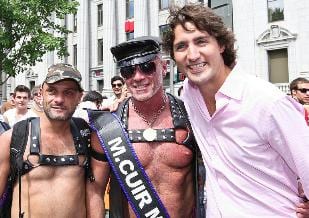Justin Trudeau will probably be the leader of the Liberal Party of Canada in little more than a week — but he’s still not sure what his first order of business will be.
Trudeau tells Xtra that on his first opposition day — a chance for the third-party Liberals to steal the spotlight and take the government to task — he’s not sure what sort of motion he will table.
“I haven’t thought about that,” he says. “So far all the questions I’ve asked have been entirely focused on how the government talks a good game about the economy . . . but keeps missing the boat on things that are actually going to help out the vast majority of Canadians who are not doing well.”
Trudeau, by all accounts, is coasting to victory after a relatively uneventful five-month leadership race. His reports to Elections Canada show that he raised well over $1 million, and his campaign team says they’ve actually pulled in much more than that. According to polling data from his once-nearest rival, Marc Garneau, Trudeau has secured 72 percent of the vote. He’s signed up more members, he has attracted more media spotlight, and — if a new Leger poll is to be believed —
His rivals in the race, however, have painted Trudeau as an inexperienced neophyte, soft on experience but long on rhetoric. Trudeau, for his part, has emphasized that a leadership race isn’t the time to be crafting a policy platform.
On harm reduction, for example, Trudeau says he’s staying open-minded but is looking to chart a course that’s “grounded in science.” That means listening to municipalities, street-level organizations and academics who are calling for drug legalization and increased accessibility for safe-injection sites, he says.
As for sex work, “I’m not entirely there yet in terms of legalization of prostitution. Obviously it’s something that we need more broadly understood science on it,” he says. “I want to hear from more people on it.”
Trudeau also responded to criticism he faced from the NDP, queer groups and even members of his own party after he missed several votes, most recently on two private member’s bills — one that would have make inexpensive HIV/AIDS drugs more readily available to Africa, the other that would enshrine transgender rights into the Human Rights Act.
He says that he staked out his position in support of the bills “very very cleanly, very clearly, very strongly” and that he skipped the votes only after he was certain that they would pass — or fail — by sizable margins.
Both votes ended up coming down to nail-biting conclusions, although the margins were larger than one vote. The trans-rights bill passed 149 to 137, while the drugs-to-Africa bill failed, with 141 in favour and 148 opposed.
Voting opens for registered Liberal members and supporters on April 7, with the results being announced on April 14.
Trudeau in his own words:
On sex work: “I understand the need to protect sex workers from violence, and the artifacts that make it legal for somebody in the street but illegal for somebody in their own home. So I definitely know that we need to look at our prostitution laws. But the exploitation of women is something I’m very concerned about, so we need to know a little more before we go down that road.”
On trans rights: “I’m a big supporter of trans rights. I was one of the ones to take a strong stand in the House while the Conservatives were snickering, in response to the trans rights bill. I was also pushing the transport minister on that aberration of an identification law that came forward. My support for the LGBT community is well known.”
On creating an LGBTQ critic role: “I think it’s a worthwhile idea. I don’t know that specifically targeting those issues with one person is necessary. I’d like to think that my entire caucus, whatever critic role someone has, that they would be sensitive to an LGBTQ lens, a gender lens, a youth lens, a senior lens, and think about all those things.”
This is the final article in a series on the Liberal Party leadership candidates. For more, see:
Meet policy wonk Deborah Coyne


 Why you can trust Xtra
Why you can trust Xtra


